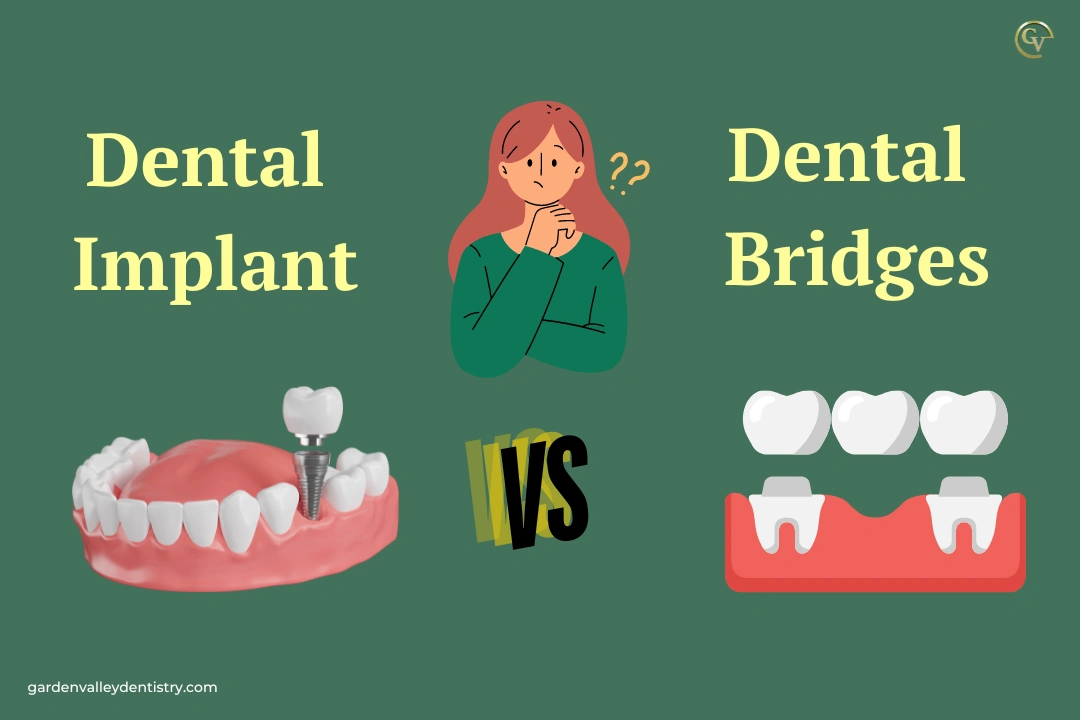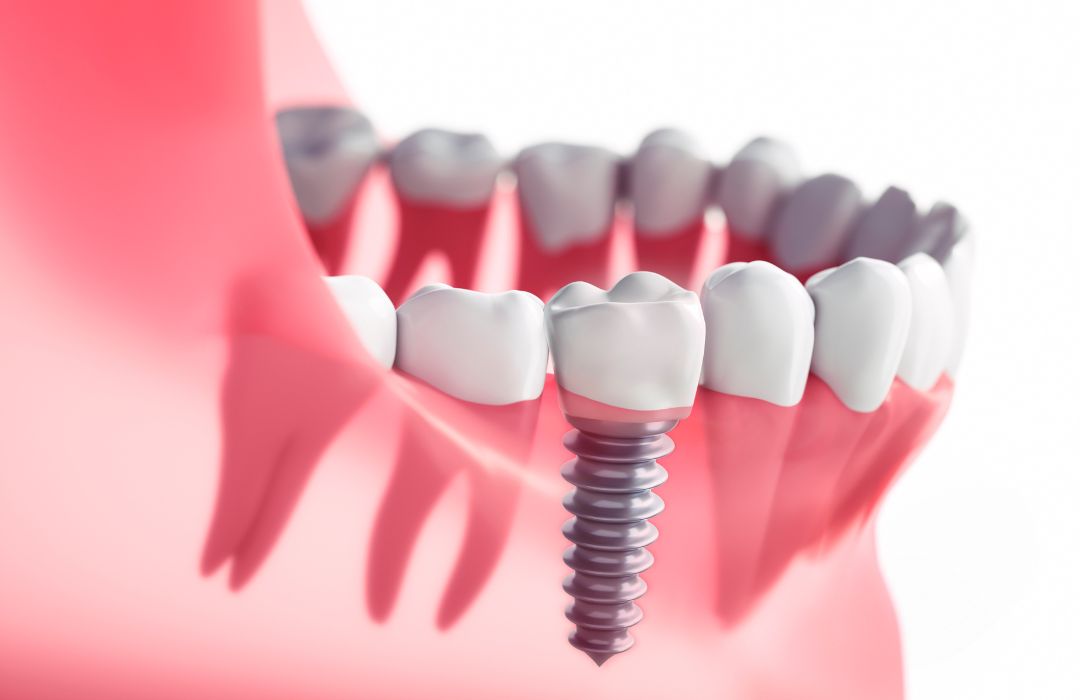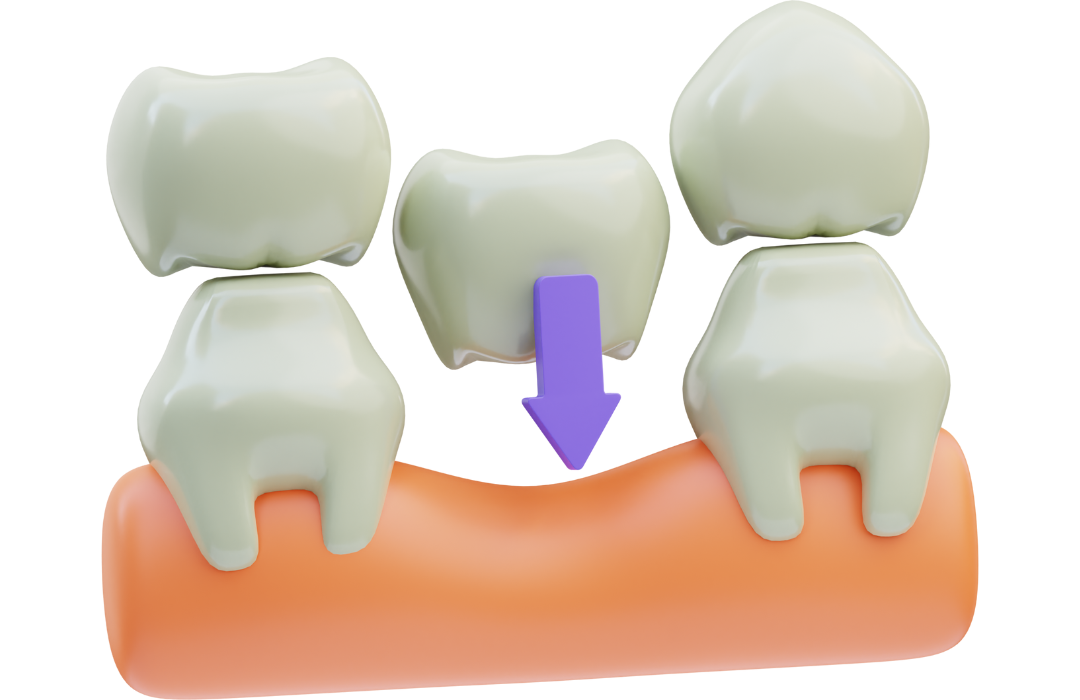
22 Dec Dental Implants vs. Bridges: Which Is the Better Option?
When it comes to restoring a missing tooth or multiple teeth, dental implants and bridges are the two most common options. Both treatments offer benefits, but choosing between them requires careful thinking. You might want to consider factors such as durability, aesthetics, and long-term oral health. In this article, we at Garden Valley Dentistry will walk you through the differences between dental implants and bridges to help you make a better decision about the best option for your smile.
Dental Implants:
Dental implants are a widely recognized procedure for tooth replacement. Comprising a titanium post, an abutment, and a custom-made crown, implants replicate the structure of natural teeth. This modern design ensures stability and functionality, making this a long-lasting solution.

Advantages of Dental Implants
- Natural Appearance and Feel: Dental implants are designed to mimic the appearance and function of natural teeth. They are custom-made to match the color, shape, and size of the surrounding teeth, ensuring a seamless blend with the existing teeth. This results in a natural and aesthetically pleasing smile.
- Improved Chewing and Speech: Unlike traditional dentures, which can slip or cause discomfort, dental implants offer stability and function similar to natural teeth. This allows patients to chew and speak normally.
- Preservation of Bone Structure: Tooth loss can lead to bone resorption in the jaw, causing a loss of facial structure and sagging. Dental implants stimulate the jawbone, preventing bone loss and preserving the natural contours of the face. This contributes to overall oral health.
- Durability and Longevity: Dental implants are known for their durability and longevity. With proper care, they can last longer, making them a cost-effective and sustainable solution for tooth replacement.
- Convenience and Maintenance: Unlike removable dentures, dental implants eliminate the need for adhesives and special cleaning routines. They can be cared for just like natural teeth, with regular brushing, flossing, and routine dental check-ups.
Bridges:
Dental bridges offer a more traditional method of replacing missing teeth. Consisting of one or more artificial teeth supported by adjacent natural teeth, bridges are anchored in place using crowns. While bridges are a viable option, they come with certain considerations.

Advantages of Dental Bridges
- Restoration of Aesthetics: Dental bridges play an important role in restoring the natural appearance of the smile. Gaps left by missing teeth can be unsightly and affect an individual’s confidence. Bridges are custom-made to match the color, shape, and size of surrounding teeth, creating a seamless and natural-looking smile.
- Improved Speech: Missing teeth can impact speech, causing difficulties in pronunciation and clarity. Dental bridges help in maintaining proper speech patterns by filling the gaps and supporting the structures involved in speech production.
- Enhanced Chewing Functionality: One of the significant advantages of dental bridges is their ability to restore proper chewing function. Missing teeth can make it challenging to chew food effectively, leading to digestion issues. Bridges provide stable and functional replacements that allow individuals to enjoy a varied and nutritious diet.
- Prevention of Teeth Shifting: When a tooth is lost, the adjacent and opposing teeth may gradually shift into the empty space. This can lead to misalignment and bite issues. Dental bridges prevent this shifting by filling the gap, maintaining the natural alignment of the teeth, and preserving the normal bite.
- Preservation of Jawbone Structure: The absence of teeth can lead to the deterioration of the jawbone over time. Dental bridges provide support and stimulation to the underlying bone, helping to maintain its density and strength. This is important for preventing further bone loss and maintaining facial structure.
- Time-Efficient Treatment: Dental bridge placement is a relatively quick and efficient procedure compared to some other tooth replacement options. The process typically involves two or three visits to the dentist, making it a convenient solution for individuals with busy schedules.
- Long-lasting Solution: With proper care and regular dental check-ups, dental bridges can be a durable and long-lasting solution for missing teeth. They are designed to withstand the pressures of daily chewing and biting, providing a reliable and stable replacement.
- Minimized Risk of Gum Disease: Gaps left by missing teeth can trap food particles and bacteria, increasing the risk of gum disease and decay. Dental bridges fill these spaces, reducing oral health issues associated with poor oral hygiene.
Conclusion:
In the comparison between dental implants and bridges, there is no one-size-fits-all answer. The choice depends on individual factors such as budget, timeline, and personal preferences. Dental implants offer unmatched durability and aesthetics, while bridges provide a tried-and-true solution with cost advantages. Consulting with a qualified dentist is crucial to determining the most suitable option for your unique needs and ensuring a confident and radiant smile for years to come.

Sorry, the comment form is closed at this time.